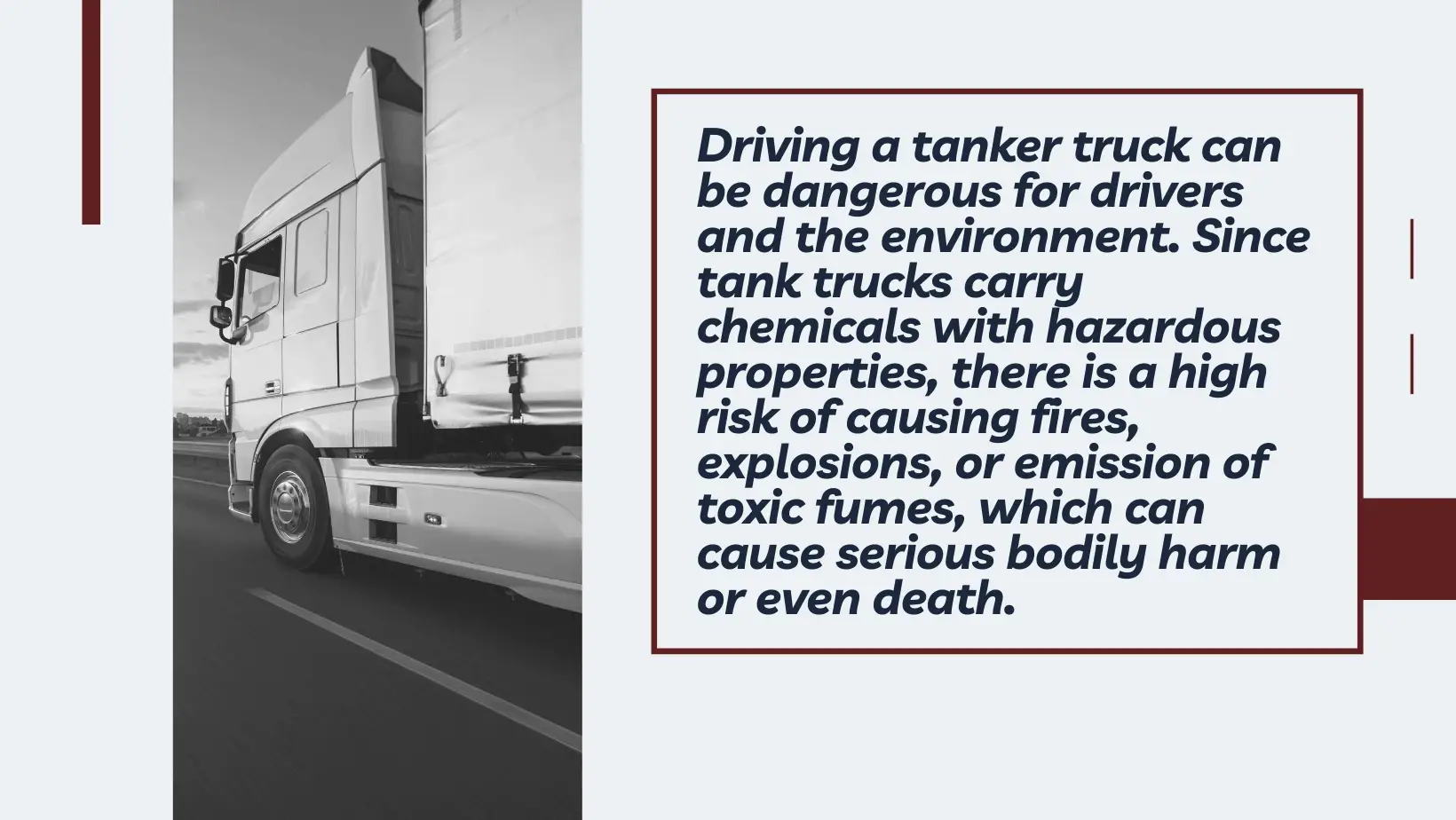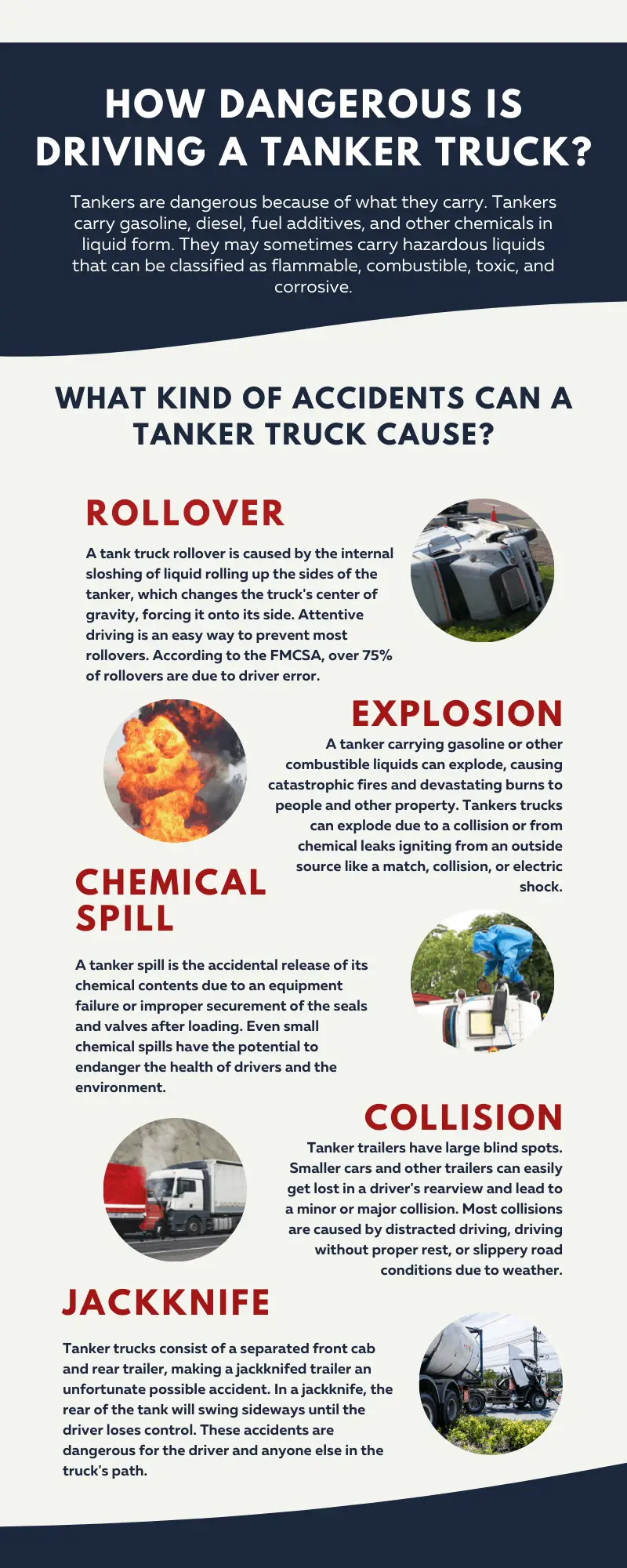If you are a tank truck driver, you need to understand how to safely operate your equipment. That includes knowing the dangers that come with tanker truck driving and how to avoid them.
Driving a tanker truck can be dangerous for drivers and the environment. Since tank trucks carry chemicals with hazardous properties, there is a high risk of causing fires, explosions, or emission of toxic fumes, which can cause serious bodily harm or even death.
Tanker truck accidents can lead to spills causing pollution. It can also lead to lengthy traffic jams due to the serious clean-up efforts that take place to save the environment from damage.
As a tanker truck driver, it's up to you to drive responsibly and understand what chemicals you're carrying. That way, you stand your best chance of preventing any of the dangers that come with driving a tanker truck.

Is it dangerous to drive a tanker truck?
Driving a tanker truck is dangerous, but such dangers can be avoided. Knowing more about your vehicle helps in making sure you can do your job as safely as possible.
Let’s know more about tanker trucks.
Tanker trucks, also known as tank trailers, or tank wagons, are named for their cylindrical-shaped trailer. The trailer functions as a giant stainless steel can on wheels instead of the typical box truck you might see on the road.
The primary function of a tank trailer is to carry liquids such as chemicals, lotions, resins, petroleum from point to point.
There are different types of tank trailers depending on the type of cargo that’s being carried. Tankers are commonly made from stainless steel, aluminum, or carbon steel because of their resistance to rust and corrosion.
Unfortunately, this makes tank trailers exceptionally heavy, especially when loaded, making them quite dangerous for the drivers who handle them.
Different Types of Tanker Trailers | ||
|---|---|---|
Trailer Type | Material | Capacity |
General Purpose Tank Trailer | SS | 7000 (Gal) |
Pneumatic Tank Trailer | SS | 1625 (cu ft.) |
Insulated Tank Trailer (with Heat) | SS | 5000 (Gal) |
Rubber Lined Trailer | SS/Chlorobutyl | 5,000 (Gal) |
Aluminum Tank Trailer | Aluminum | 8,500 (Gal) |
Fiberglass Reinforced Plastic Tanker | Fiberglass | 5,600 (Gal) |
#myassissotiredthat my tanker truck crammed full of potentially dangerous substances could cross the centerline and drive into oncoming traffic. pic.twitter.com/rQXvpNT5BL
— RussianGoat (@realRussianGoat) November 17, 2019
Why are tankers dangerous? |
Tankers are dangerous because of what they carry. Tankers carry gasoline, diesel, fuel additives, and other chemicals in liquid form. They may sometimes carry hazardous liquids that can be classified as flammable, combustible, toxic, and corrosive.
You might have seen a tanker truck first-hand unloading products into a gas station so that you can fill up your own gas tank. And, you might be surprised to discover that there is a wide range of materials transported in bulk by tank trucks every day.
The global supply chain relies on liquid chemicals. Industries like agriculture, mining, pharmaceuticals, even pet products all depend on a liquid bulk tanker to safely pick up and deliver products for even the most basic human necessities.
Check out the list of products that are put on tanker trucks as cargo on a daily basis:
Tanker truck chemical cargo:
- Gasoline and petroleum products
- Crude oil
- Diesel
- Ethanol
- Friction reducers
- Acids
- Pesticides, herbicides & fertilizer
- Plasticizers & latex
- Surfactants
- Coatings
- Adhesives
- Composites
- Lubricating agents
Tanker truck food-grade cargo:
- Milk and dairy products
- Beer, wine, and spirits
- Vegetable oil, cooking oil & beef tallow
- Animal fat
- Sugar alcohol
The most dangerous of these chemicals fall under the class of hazardous materials, making them a literal ticking time bomb on wheels. A single mistake can result in a devastating explosion causing catastrophic damage in a matter of seconds, making tankers one of the most dangerous vehicles on the road today.

Is hauling hazmat dangerous for drivers?
Hauling hazardous materials pose a big risk for tanker drivers, and the properties of every hazmat chemical differ. Chemicals can cause poisoning and severe burns in the case of mishandling.
To minimize the danger of hazardous materials, drivers who want to carry this type of cargo must go through additional safety training. This includes applying for an endorsement on their CDL to transport hazmat chemicals.
There are 9 hazard classes recognized by the FMCSA, and all of them present a unique danger to everyone who shares the road with them...
9 Classes of Hazardous Materials | |||
|---|---|---|---|
Class | Hazard | Divisions | Example |
1 | Explosives | 1.1,1.2, 1.3, 1.4 1.5, 1.6 | Fireworks |
2 | Gases | 2.1, 2.2, 2.3 | Oxygen |
3 | Flammable and Combustible Liquid | 3 | Gasoline |
4 | Flammable Solid, Spontaneously Combustible, and Dangerous When Wet | 4.1,4.2, 4.3 | Potassium |
5 | Oxidizer & Organic Peroxide | 5.1, 5.2 | Ammonium Nitrate Fertilizer |
6 | Poison (Toxic) and Poison Inhalation Hazard | 6, 6.1 | Cyanide |
7 | Radioactive | 7 | Enriched Uranium |
8 | Corrosive | 8 | Hydroclauric Acid |
9 | Miscellaneous | 9 | Lithium Ion Batteries |
Datasources: FMCSA.dot.gov & Chemsafetypro.com | |||
Tanker truck carrying brine water(not dangerous) rollover on Route 2 just north of Ohio/Brooke county line. Truck driver is NOT injured. Cause is yet to be determined. Unknown whether weather is a factor. @WTRF7News pic.twitter.com/MN9vRk25JX
— Falicia Woody (@WxFalicia) January 9, 2018
What kind of accidents can a tanker truck cause? | |||
Tanker trucks are prone to accidents like any vehicle on the road. While poor weather, reckless drivers, and negligence can contribute to accidents, tanker trucks carry additional risk due to their design and the cargo they carry. |
Rollover
Referred to by drivers as "flipping the trailer". Tanker trucks are not in danger of rolling over due to their design but rather the contents they are carrying. Tanker trucks are designed with a lower center of gravity than other trailer types in order to prevent rollovers from happening.
A tank truck rollover is caused by the internal sloshing of liquid rolling up the sides of the tanker, which changes the truck's center of gravity, forcing it onto its side.
Attentive driving is an easy way to prevent most rollovers. According to the FMCSA, over 75% of rollovers are due to driver error.
Explosion
A tanker carrying gasoline or other combustible liquids can explode, causing catastrophic fires and devastating burns to people and other property. Tankers trucks can explode due to a collision or from chemical leaks igniting from an outside source like a match, collision, or electric shock.
Chemical spill
A tanker spill is the accidental release of its chemical contents due to an equipment failure or improper securement of the seals and valves after loading. Even small chemical spills have the potential to endanger the health of drivers and the environment.
Collision
Tanker trailers have large blind spots. Smaller cars and other trailers can easily get lost in a driver's rearview and lead to a minor or major collision. Most collisions are caused by distracted driving, driving without proper rest, or slippery road conditions due to weather.
Jackknife
Tanker trucks consist of a separated front cab and rear trailer, making a jackknifed trailer an unfortunate possible accident. In a jackknife, the rear of the tank will swing sideways until the driver loses control. These accidents are dangerous for the driver and anyone else in the truck's path.
So, is driving a tank truck dangerous?
The answer is a resounding yes.
Every time a truck driver gets behind the wheel, they are at risk for all of the reasons I mentioned in this article. As the demand for trucking increases and customers continue to push for faster deliveries, this danger will increase for years to come.
It's up to everyone, dispatchers, fleet managers, and especially drivers, to do their part and create a culture of safety to combat the increasing dangers for truck drivers.
